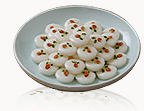|
|
|
|
|

| Home < The food
culture of Andong < Traditional food |
|
 |
|
 Grain food has great value and variety.
Grain food has great value and variety. |
 |
 The chief article of food and a subsidiary food
are clearly divided.
The chief article of food and a subsidiary food
are clearly divided. |
 The sorts of food and the art of cooking are various.
The sorts of food and the art of cooking are various. |
 Korean food contains many kinds of spices so that
tastes
Korean food contains many kinds of spices so that
tastes
of the food are diverse. |
 Food is regarded in the same light with medical
supplies.
Food is regarded in the same light with medical
supplies. |
 Food is flavor-centered, not appearance-focused
and has modest
Food is flavor-centered, not appearance-focused
and has modest
taste. |
 There are strict rules of setting a meal table.
There are strict rules of setting a meal table. |
 We have to observe table manners
We have to observe table manners |
 There are manners and customs of preparing a festive
day's table.
There are manners and customs of preparing a festive
day's table. |
|
 |
Andong is located in the interior (provinces) of a country
and the Naktong river flows around the village in an S-shape
so that most people do dry-field farming. Owing to the
topographical features, there are many agricultural products
such as red peppers, garlics, sesame, and the local foods
are rather spicy and salty. When the people make Gimchi
or prepare zigae, they always add many spices such as
powdered red pepper and garlics. As they get lots of freshwater
fish from the Naktong River, they often cook a hot chowder.
The sweetfish from the Naktong River is so especially
delicious that people used to present it to the king.
There are lots of traditional food in Andong, owing to
the fact that many Yangban(noblemen) used to live there.
The people of Andong don't make food luxuriously and extravagantly,
but they prepare food for their guests wholeheartedly.
It is because of this custom that each head family has
their own food. Soup is an indispensable dish in Andong,
and the soup is usually made by soybean flour or a radish.
Furthermore, there are lots of famous food such as salted
mackerel, Sikhye, and Heotjesabap.
|

|
|
|
|